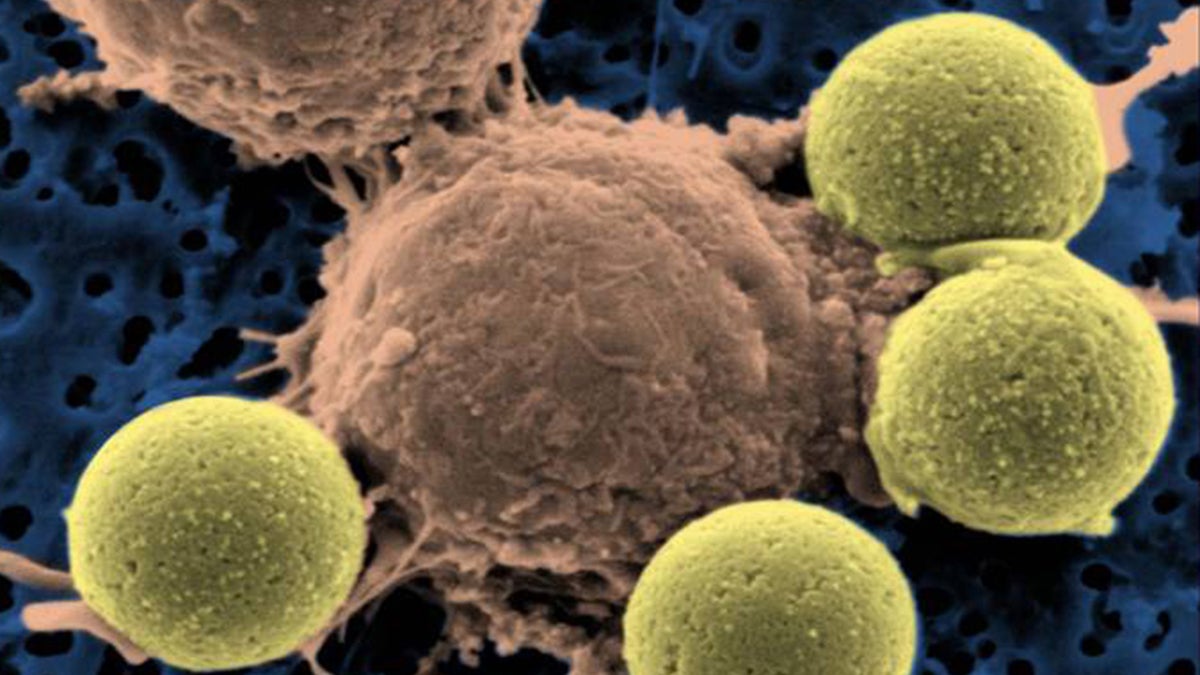The high-stakes legal fight over a ‘cancer cure’ from Penn
Listen
This microscopy image provided by Dr. Carl June shows immune system T-cells
What if something hailed as a ‘cure for cancer’ got caught up in a legal battle among some of the biggest names in cancer treatment?
What if something hailed as a ‘cure for cancer’ got caught up in a legal battle among some of the biggest names in cancer treatment? That’s the case with a pioneering therapy developed here in Philadelphia.
The science behind it is breathtaking: You take a cleaned-up version of the stuff that makes HIV so potent; you inject it into a patient’s white blood cells; those re-engineered “T-cells” then seek out and destroy the cancer pulsing through a leukemia patient’s veins.
By the time Bob Levis turned to the highly experimental treatment, which promised to turn his own immune system into a cancer fighter, he was in bad shape.
“I was living on blood transfusions, my bone marrow was blocked full of cancerous lymphocytes,” Levis said. “My body was not making the things you need to live.”
Levis lives outside Allentown, Pa., as a semi-retired consultant in international trade. After he beat leukemia once, it came back in a more aggressive form.
Levis was terminal when he volunteered for the new T-cell treatment from the Hospital of the University of Pennsylvania this time last year.
Now he’s fine.
“What’s all this mean to me?” Levis said. “I was on death’s doorstep. This procedure saved my life.”
Ownership battle
Levis is one of just a few dozen patients who have come to Philadelphia to ride what many are calling the next wave of cancer treatment.
The new technique has won its lead scientist, Carl June of Penn, local accolades and national headlines.
June’s treatment has proved successful with several forms of blood cancer. It will soon be tested against other cancer types.
The drug giant Novartis put up big money in 2012 to partner with Penn. But as the potential breakthrough inches toward commercialization, it has become ensnared in a handful of lawsuits.
“It boils down to who owns the invention,” said Susan Mack, a biotech intellectual property expert at the Washington, D.C., law firm Sughrue Mion.
The dispute pits Penn against St. Jude Children’s Research Hospital in Memphis, Tenn. It all started in 2012, with St. Jude accusing Penn of breaching a research partnership agreement. Penn then counter-sued, challenging the validity of St. Jude’s patent on T-cell therapy.
Collaboration vs. competition
Mack says things like this tend to happen when big stakes are on the line.
“Scientists are not all that savvy when it comes to intellectual property,” Mack said. “They kind of forget about the collaboration and both sides start thinking that the work that’s been done is their own work.”
Penn wouldn’t make anyone available to speak to The Pulse, citing the ongoing litigation.
St. Jude provided a written statement, expressing confidence in its patent.
Last month a new venture-backed biotech firm from Seattle teamed up with St. Jude in the fight against Penn and Novartis. The firm is affiliated with Memorial Sloan-Kettering Cancer Center in New York and other major players.
Experts say it will all likely get settled before going to trial, as the two parties press ahead with proving out their T-cell breakthroughs. They’re set to meet with a federal judge in Philadelphia later this month.
WHYY is your source for fact-based, in-depth journalism and information. As a nonprofit organization, we rely on financial support from readers like you. Please give today.



